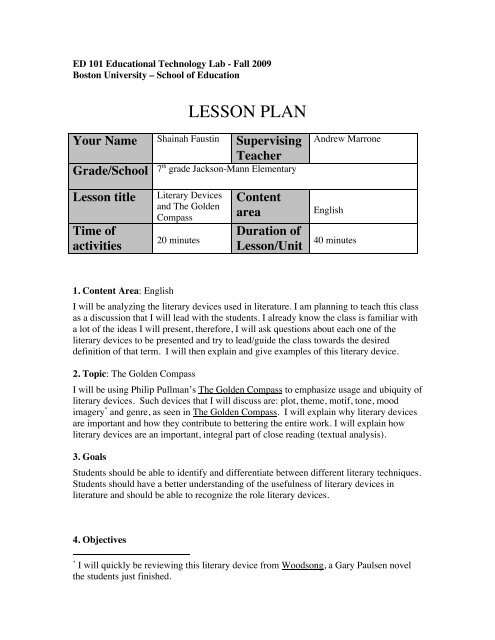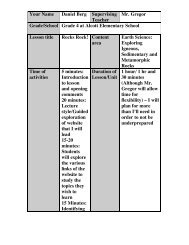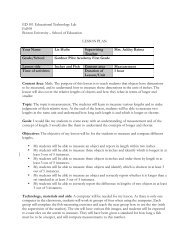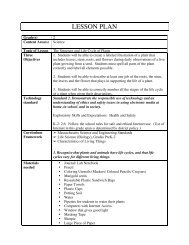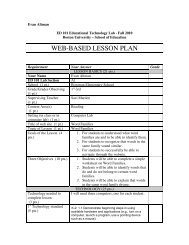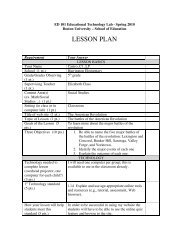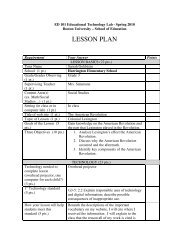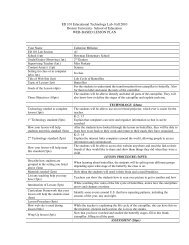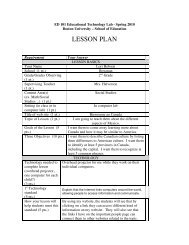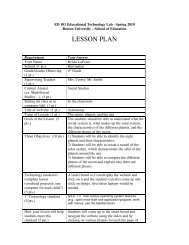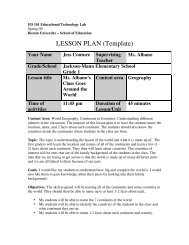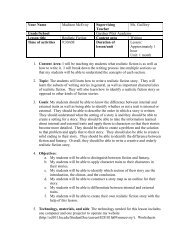The Golden Compass Lesson Plan.pdf - ED101 - Boston University
The Golden Compass Lesson Plan.pdf - ED101 - Boston University
The Golden Compass Lesson Plan.pdf - ED101 - Boston University
You also want an ePaper? Increase the reach of your titles
YUMPU automatically turns print PDFs into web optimized ePapers that Google loves.
ED 101 Educational Technology Lab - Fall 2009<strong>Boston</strong> <strong>University</strong> – School of EducationLESSON PLANYour Name Shainah Faustin SupervisingTeacherGrade/School 7th grade Jackson-Mann ElementaryAndrew Marrone<strong>Lesson</strong> titleTime ofactivitiesLiterary Devicesand <strong>The</strong> <strong>Golden</strong><strong>Compass</strong>20 minutesContentareaDuration of<strong>Lesson</strong>/UnitEnglish40 minutes1. Content Area: EnglishI will be analyzing the literary devices used in literature. I am planning to teach this classas a discussion that I will lead with the students. I already know the class is familiar witha lot of the ideas I will present, therefore, I will ask questions about each one of theliterary devices to be presented and try to lead/guide the class towards the desireddefinition of that term. I will then explain and give examples of this literary device.2. Topic: <strong>The</strong> <strong>Golden</strong> <strong>Compass</strong>I will be using Philip Pullman’s <strong>The</strong> <strong>Golden</strong> <strong>Compass</strong> to emphasize usage and ubiquity ofliterary devices. Such devices that I will discuss are: plot, theme, motif, tone, moodimagery * and genre, as seen in <strong>The</strong> <strong>Golden</strong> <strong>Compass</strong>. I will explain why literary devicesare important and how they contribute to bettering the entire work. I will explain howliterary devices are an important, integral part of close reading (textual analysis).3. GoalsStudents should be able to identify and differentiate between different literary techniques.Students should have a better understanding of the usefulness of literary devices inliterature and should be able to recognize the role literary devices.4. Objectives* I will quickly be reviewing this literary device from Woodsong, a Gary Paulsen novelthe students just finished.
c. Tone vs. Moodd. Imagery4. After explaining, I will give students a passage that either I wrote or found onlinethat makes use of lost of such techniques. I will ask them to find these examplesand ask for volunteers to share what they found and why they choose this as anexample.5. At this point, we will line up and walk down the hall to the computer lab.6. Students will sit in pairs at a computer and I will explain how the online quizzeswill allow them to “test” how well they assessed the information.7. On the blackboard in the computer lab, I will explain how we will be usingtechnology in the lab. Here, I will explain my technology frameworks:a. Students will use a web browser.- I will write the http:// for my website on the board andbased on the .edu at the end of the site, I will explain thedifferences between the different kinds of sites (.edu, .com,.org) and ask students to identify two different websitesappropriately.- Students will need to copy the site from the board to theirURL box adequately in order to access the site.- Students will then demonstrate effectivebrowsing using the site. I will be walkingaround the lab to see how they navigatethe pages to review information on the sitefor their quiz.b. Technology Frameworks:1. [G6-8: 1.18] Use Web browsing to access information (e.g., enter a URL, accesslinks, create bookmarks/favorites, print Web pages).2. [G6-8: 3.1] Explain and demonstrate effective searching and browsing strategieswhen working on projects.3. [G6-8: 1.19] Identify probable types and locations of Web sites by examiningtheir domain names, and explain that misleading domain names are sometimes created inorder to deceive people (e.g., .edu, .com, .org, .gov, .au).After accessing the site, students will be required to take an online quiz on thewebsite that will reemphasize the material in a fun way. Before taking the quizhowever, they will need to browse the site for information as needed in order toscore at least an 80% proficiency level on the quiz.8. I will briefly review the information and praise students for their good work.9. Follow-up- This lesson will help students in reading all of their future works. <strong>The</strong>yshould understand the importance of literary techniques as pertains to theme, plot, etc. Intheir reading assigned for that night, I will ask them to make a list of all the techniquesthey encounter in their reading.
VI. Web-based Assessment:1. Why are literary devices important?a. Literary devices help you better understand the story.b. Literary devices captivate our attention when reading.c. Literary devices help convey the author’s message.d. All of the above.2. What does Pullman think about writing?a. Authors should use writing to tell readers how to feel.b. Readers must accept what the author is saying in the book.c. Readers should make their own meaning of the story.d. Authors should tell readers how to feel about the story.3. <strong>The</strong>me is:a. <strong>The</strong> message the author is trying to convey throughout the book.b. A reoccurring object or idea throughout the book.c. <strong>The</strong> same thing as motif.d. None of the above.4. Which of the following is not a literary device?a. Allusionb. Imageryc. Metaphorsd. Paragraphs5. <strong>The</strong> difference between tone and mood is:a. Tone is a sound while mood is a feeling.b. Tone is louder than mood.c. Tone is the author’s attitude about what he or she is writing, while mood isthe atmosphere created by the author.d. <strong>The</strong> author tells you the tone, but you have to figure out the mood.6. Does Ms. Faustin have the same birthday as Phillip Pullman?a. Trueb. FalseAnswer Key:1. d2. c3. a4. d5. c6. a


